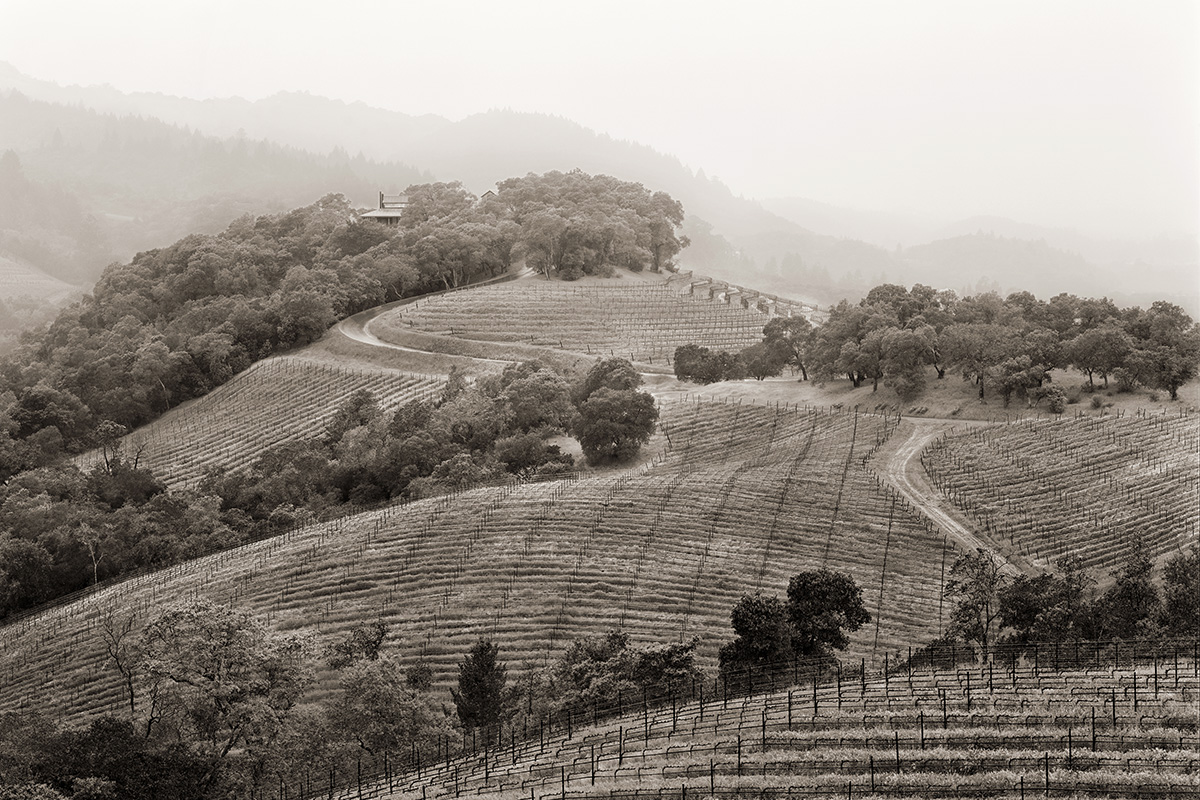
Harlan Estate’s vineyards in Napa Valley, California
Will Harlan is the second-generation managing director of California’s iconic Harlan Estate, maker of some of the most expensive and desirable red wines in the world. Over a Zoom tasting of the winery’s flagship wines, Harlan, who took over from his father Bill this year, talks to LUX Editor-in-Chief Darius Sanai about how to create a business for the generations
LUX: Your father Bill Harlan, who founded Harlan Estate, got into the wine business almost by accident.
Will Harlan: Yes, Harlan Estate is the first wine endeavour that my father founded, it got started in the early 80s and his vision for Harlan Estate evolved over the course of his life. He grew up in Los Angeles, not around wine, or anything, but he had the opportunity to go to Berkeley [part of the University of California].
During his college years, that he had heard about this place up north, where you could taste wine for free. They wouldn’t check your ID and he really enjoyed going up there as a college student and kind of developed this very fuzzy dream that someday, if he could ever afford it, he would love to find a piece of land, plant a vineyard, make a little bit of wine, start a family.
Follow LUX on Instagram: luxthemagazine
He graduated and did a number of different things, but it wasn’t until he approached his forties where he finally had the wherewithal to be able to start thinking more seriously about this dream of coming to Napa. It was probably in the late 70s that he started coming up here and looking for vineyard land, not knowing anything about the wine industry, and through a certain series of events, he tried to purchase a piece of property.
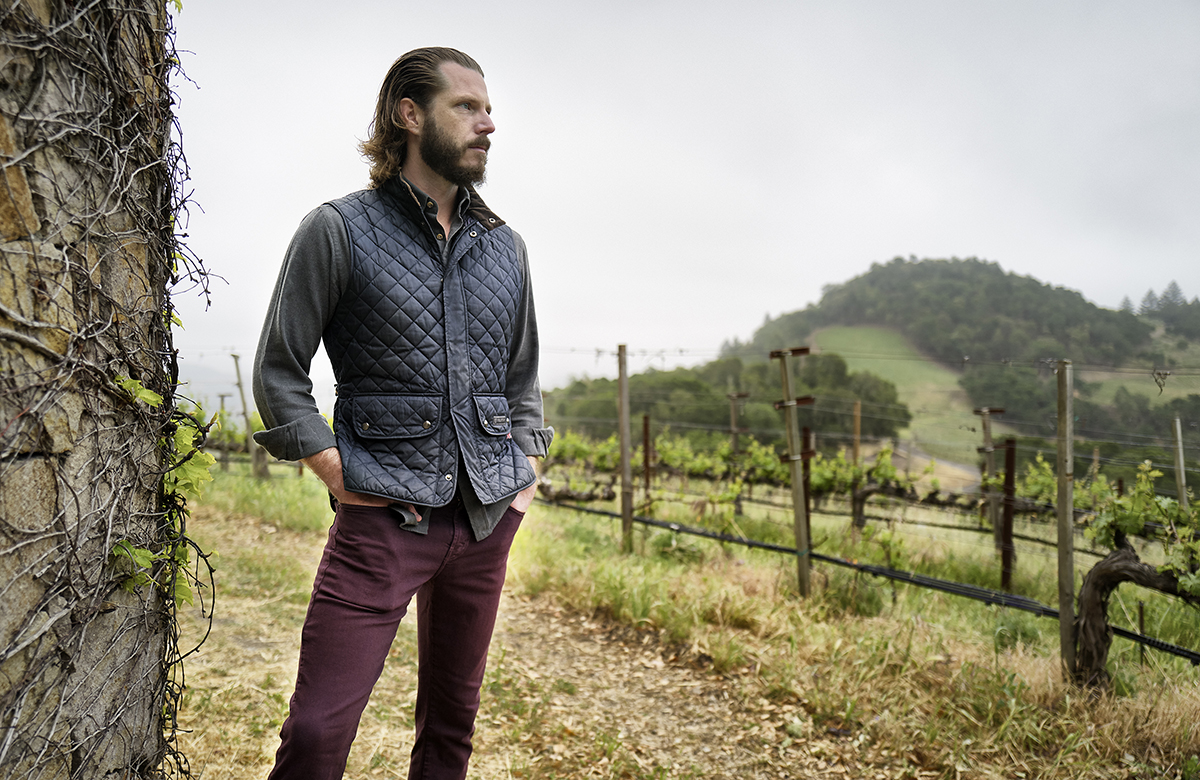
Will Harlan, second-generation managing director of Harlan Estate
[Napa wine legend] Robert Mondavi really took my dad under his wing, wanting to show him the potential of Napa and that not all land in Napa is created equal. Robert understood how fuzzy this original dream that my father had was and maybe how naïve it was too, but he also recognised that my dad was genuinely interested in doing something in wine and wanted to help.
Mondavi says, “Bill, I know you’re interested in buying some land in Napa Valley, but not all land is created equal. I want to send you to France and really show you what some of the great wines of the world are all about, pieces of land that they’ve been able to capture and what sets them apart.” So he organised a trip for my dad to go to Bordeaux and Burgundy, made the introductions. At the time I don’t think the French wine producers were particularly excited about welcoming random Americans into their homes so it was really important that Robert was able to set this up. My father returned to Napa Valley with this drive, this new vision of wanting to create a “first growth” of California.
LUX: What is your personal vision for Harlan Estate?
Will Harlan: I’m very excited for the future. I feel like there’s so much potential. As a region, I think we’re really coming into our own, in terms of an international kind of understanding and recognition, but I also feel that there’s always the opportunity to understand your land better.
Read more: Product designer Tord Boontje on sustainable materials
LUX: How does Napa Valley compare to Bordeaux, or specifically your wines to top wines from Pauillac (home of chateaux like Lafite, Latour and Mouton-Rothschild)?
Will Harlan: We never like drawing comparisons. They are all different expressions of Cabernet and I think that’s wonderful. We have quite different climates. In Napa Valley, we have almost no rain during the growing season, but we have plenty of sunshine and the humidity is very low so we don’t have mildew issues. We have vines that get quite dry by the end of the growing season so we’ve got to focus almost all of our efforts on ensuring that all of our vineyards are used to this low hydration environment by forcing them to grow very deep root systems for example.
It’s very easy for us to ripen fruit. It’s never really a question whether or not we’re going to achieve ripeness. For us, it’s about aligning that ripeness at an earlier stage in the season before acidity begins dropping off and before sugars start to rise too much.
At the end of the day, the character of the two regions is quite different and I feel that the best thing you can do is to try to really understand your plot within your region and make it the best version of itself.
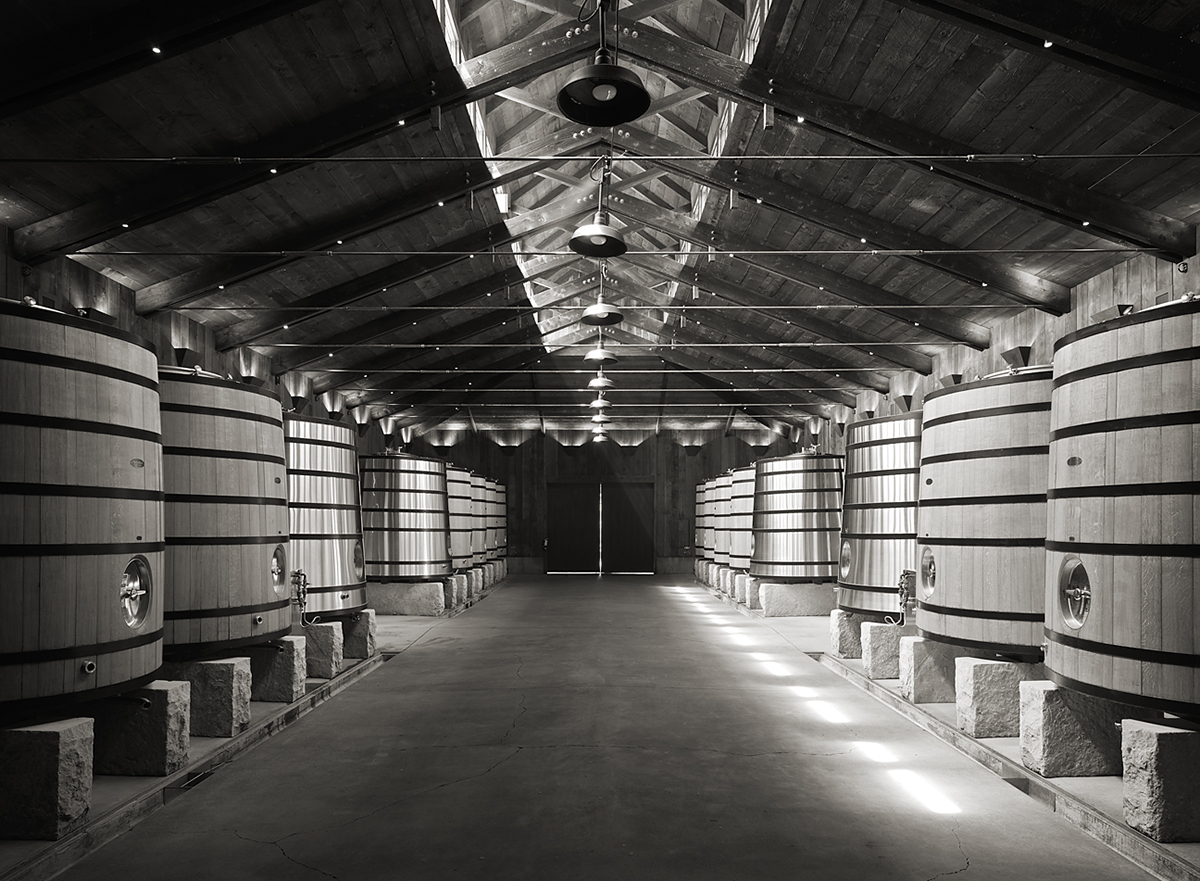
The Harlan Estate tankroom
LUX: We know some wine collectors who think about buying wine estates and then decide against it, saying they will be a money-pit..
Will Harlan: I’d say they’re probably right! It requires a lot more investment than people expect, but mainly, a lot more time. People who are very wealthy tend to understand return on investment timelines very well and once they start understanding what that means in the wine world, they think, “Right, you wouldn’t touch this.” So, I think it really comes down to what are your motives? Are you doing this because you happen to love wine and you love drinking wine and you think it would be fun and interesting? I would probably say that’s not the ideal lens to approach getting into the wine industry. But if you’re ready to devote your life and your time and your effort, and probably more capital than you might think, then okay.
Read more: Is Germany the next global art hub?
LUX: How much harder is it to make a great wine at this level than a good wine? And what do you have to do differently?
Will Harlan: It probably comes back to my feelings on character versus quality. First of all, it’s about finding a piece of land and being able to capture that land to create a very distinctive wine. It takes a lot of time and resources, but you also need to recruit a team that has the capacity to really dive in and understand the land. You have to have one of the better teams around, but you also have to understand that it takes time, decades, even generations for people to truly connect to the land, to become familiar with the properties, the growing seasons and how they react to different weather environments.
LUX: We are tasting the 2006 Harlan Estate today – is that the year you started being involved in the family business?
Will Harlan: In ‘06, I was almost 20 years old. So, I wasn’t as involved in the family business yet, but I was always a little bit curious about the wine industry. I didn’t actually think I was going to go into it. I don’t think I had the perspective or the context at that age. On the other hand, it was the first year I worked harvest which was the start of my experience.
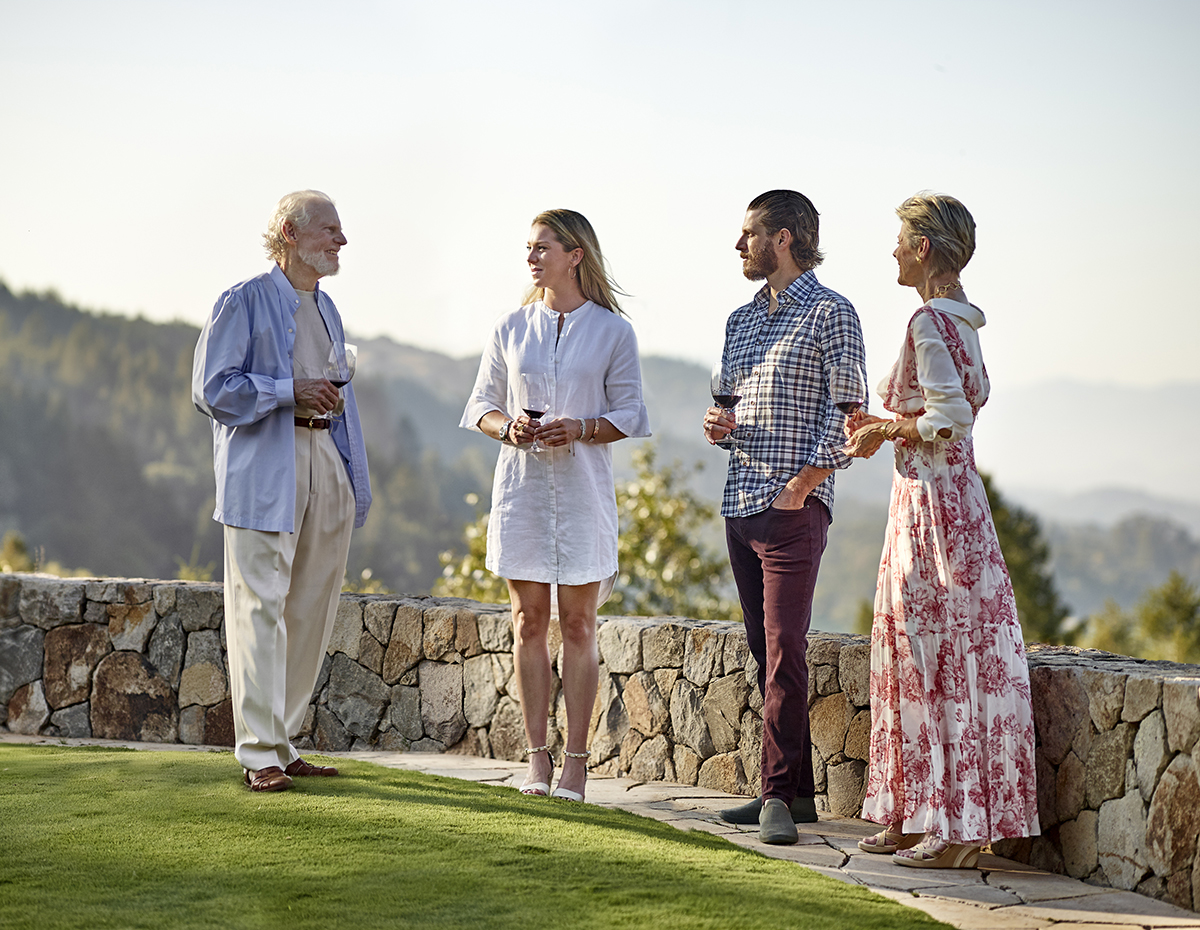
The Harlan family on the lawn of the estate
LUX: And then we have the 2012. By then, you were then fully involved. Is that correct?
Will Harlan: I had started working on a little side project. I was living in San Francisco, working in the tech space and the consumer internet tech space. It turns out San Francisco is just close enough to Napa Valley to feel that gravitational pull I had already started to feel. I was curious about wine, and I was starting to attend a lot of the blending sessions that we had.
I had this idea of wanting to create my own little bottling. It didn’t have a label or a name. I was just bringing it to different social events. I ended up building that into its own proper label called “The Mascot”, which is made from the younger vines by different properties. That was the spark for me: getting to see that I could find my own entrepreneurial path within wine and the family business.
So, that’s what drew me in, but of course, I didn’t really have any credibility in wine world. You have to have worked a proper harvest. 2012 happened to be the year that I got really serious about joining the family business and so I spent that growing season in the winery. It was so rewarding and so fascinating to really understand the production side of things.
Read more: The gastronomic delights of Suvretta House, Switzerland
LUX: Was there ever a possibility given how close you are to Silicon Valley, that you might have just ended up there?
Will Harlan: Very much, that’s what I thought my life was going to be. So, I’m glad that I found my way back to wine, but the tech world has always been very interesting to me. I got to forge a few really strong friendships there with folks that were at the beginnings of their path.
LUX: There’s quite a strong link between Silicon Valley entrepreneurs and Napa Valley vintners…
Will Harlan: There is. I feel like we have two speeds: Silicon Valley moves extremely quickly and Napa Valley moves at the pace of the seasons. I think Silicon Valley oftentimes yearns for something that is connected to the land, something that is physical, something that has a visceral core to it, that connection to nature. But at the same time, Napa Valley can learn from the Silicon Valery approach to work. So, there’s a wonderful connection between the two.
LUX: Bernard Arnault [owner of LVMH and Chateau Cheval Blanc, Dom Pérignon and Krug champagnes, and many more] or Francois Pinault [owner of Chateau Latour, Clos du Tart, and many more] come to you and say, “Name your price. I want your winery.” What do you say?
Will Harlan: We never built any of this with the intention of selling.
LUX: I’m offering you $2 billion.
Will Harlan: We’re not doing this for the money. Before my dad was in wine, he was in real estate development. You can make a lot more money in real estate development than you can making a few thousand cases of wine. It’s never been our driving motive. And as I said before, you only really get into wine if you truly love it.
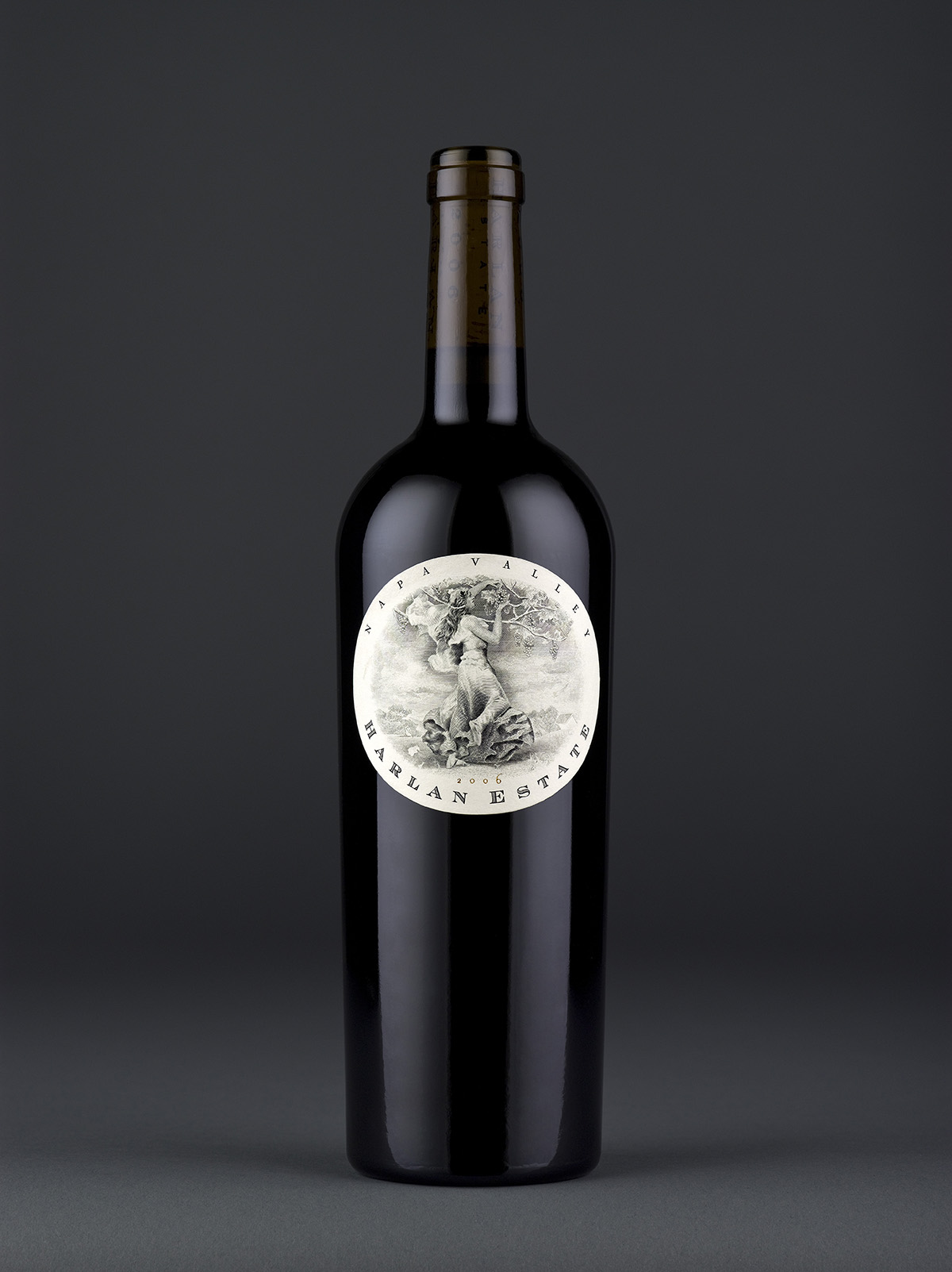
Harlan Estate 2006
The Wines (tasting notes by Will Harlan and Darius Sanai)
Harlan Estate 1994
Will Harlan: It’s always had a certain energy and an incredible density. It’s a very tight weave, not necessarily a heavy fabric, but the weave is very fine. It’s just beginning to soften, showing you a little bit of detail. We think it’s going to be one of our very long-lived wines.
Darius Sanai: Initial impressions are of a full bodied, fruit-led wine, but after a few seconds this dissolves into an array of lacy micro-flavours, from meats to dried fruit via summer blossom. Remarkable. As good as any top Bordeaux, except different, less stern and reticent, more talkative, but just as much of a polymath. Serve at a dinner with guests including Ptolemy, Queen Elizabeth I, Einstein, Jane Austen and Audrey Hepburn.
Harlan Estate 2006
Will Harlan: A cooler vintage. It’s taken a bit of time for this wine to relax. It’s still in the phase of being a little bit introverted. It has a certain herbal quality that I always recognise and I feel there is some wonderful detail in there and some higher notes.
Darius Sanai: This wine is all about potential. Like dining with a group of star PHD students from Oxford and Stanford. Enjoyable company now – it’s not closed down or dull – but you just know how much more it will have to say in 10 or 20 years.
Harlan Estate 2012
Will Harlan: This is a vintage very close to my heart. It was a very good growing season Wonderful. It always had this welcoming generosity. It is almost this kind of spherical experience on the palate. Very, very welcoming, very approachable and very seductive in a sense. Very plush and velvety tannins.
Darius Sanai: One to open when receiving the Marquise de Pompadour in one of your rooms at Versailles.
Harlan Estate 2016
Will Harlan: In the long run, I feel that this will be recognised as one of the great vintages of Harlan. It’s kind of like the 1994 in a certain sense. The winter before the 2016 vintage, we finally got some much-needed rain. It shows you so much detail and complexity, even though it’s quite young. It’s special.
Darius Sanai: An intellectual and a seducer: rich and rigorous at the same time. It doesn’t taste young, and it’s delicious now, but you know all its complexities will develop over the eras. A wine for the President to open to celebrate the US Tricentennial in 2076.
Find out more: harlanestate.com







Recent Comments